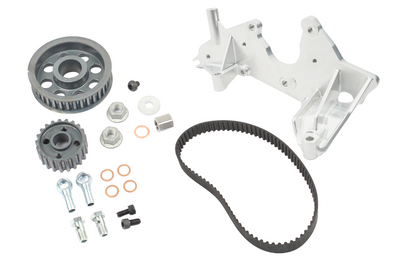2013 Treg TDI with CNRB engine (pre-dieselgate-fix designation was CNRA) engine, 140K miles. (always used lubricity fuel additive btw). Malone tune with EGR delete. Now I'm doing the physical delete for EGR, but I need to find the instructions for the egr-delete-parts-kit.
Did EGR delete in the tune. I was suspecting an EGR cooler leak, and wanted to prevent future EGR cooler leak, so did the godawwwfullll lotsa hours of frustrating removal of all that top crap/intake manifold to get to it and now have the whole V exposed. Now i have questions need advice on what else to do while I'm in there. I'd have to shoot myself if I had to do that again if I didn't change a preventive maintenane item(s) I should have!
0.1. Coolant/water pump - DONE new one installed.
0.2. New seals for EGR cooler, tho hoping to throw it away with the physical-delete kit I have.
0.3. New seals for Oil Cooler - have yet to re-install it, wondering if I should put some high extra seal/oil-plan glue on those seals??
Should I put some blue loctite on those bolts too? for extra sure I never want to get to that part of the engine in my lifetime ;-)
1. HPFP - seems a no-brainer to put in a new pump. It's near expected life. I think it's part # 019130755bcKT (ECS Tuning bundles with a new hp fuel line the manual says can't be re-used.
1a. anyone know the part #s for the HP fuel lines?
1b. ECS Tuning wants $1100 for HPFP with the hp lines included. (Stealership wants a f'ing $1,929! ) Other reccomended sources?
2. Turbo New/Rebuild? I have to also R&R the dang turbo to get at the back of the engine to replace the highly obstructed/hidden HPFP. Turbo expected life? Get a new one? source? Refurbished?/good rebuilder source?
3. oil cooler temp sensor? it extracts from front of engine and I don't see any dependencies on access to the exposed 'V" so maybe OK to leave it?
TIA - Really appreciate the advice.
BTW - re getting that dang intake manifold out, be sure to get a LONG T30 screwdriver - or T-handle (harbor freight had) and a L-shaped key too is handy... where a rachet drive T30 is too bulky to fit in ridic hard to get to caps screws on back corners especially. Also I took notes and even wrote with sharpie or grease pencil or notes the various lengths of T30 bolts/screws - so many different lengths to get in the right holes especially the EGR and oil cooler units. Even with the good T30 tools it took me 8-9 hours to get that dang intake out. I'm slow.
Did EGR delete in the tune. I was suspecting an EGR cooler leak, and wanted to prevent future EGR cooler leak, so did the godawwwfullll lotsa hours of frustrating removal of all that top crap/intake manifold to get to it and now have the whole V exposed. Now i have questions need advice on what else to do while I'm in there. I'd have to shoot myself if I had to do that again if I didn't change a preventive maintenane item(s) I should have!
0.1. Coolant/water pump - DONE new one installed.
0.2. New seals for EGR cooler, tho hoping to throw it away with the physical-delete kit I have.
0.3. New seals for Oil Cooler - have yet to re-install it, wondering if I should put some high extra seal/oil-plan glue on those seals??
Should I put some blue loctite on those bolts too? for extra sure I never want to get to that part of the engine in my lifetime ;-)
1. HPFP - seems a no-brainer to put in a new pump. It's near expected life. I think it's part # 019130755bcKT (ECS Tuning bundles with a new hp fuel line the manual says can't be re-used.
1a. anyone know the part #s for the HP fuel lines?
1b. ECS Tuning wants $1100 for HPFP with the hp lines included. (Stealership wants a f'ing $1,929! ) Other reccomended sources?
2. Turbo New/Rebuild? I have to also R&R the dang turbo to get at the back of the engine to replace the highly obstructed/hidden HPFP. Turbo expected life? Get a new one? source? Refurbished?/good rebuilder source?
3. oil cooler temp sensor? it extracts from front of engine and I don't see any dependencies on access to the exposed 'V" so maybe OK to leave it?
TIA - Really appreciate the advice.
BTW - re getting that dang intake manifold out, be sure to get a LONG T30 screwdriver - or T-handle (harbor freight had) and a L-shaped key too is handy... where a rachet drive T30 is too bulky to fit in ridic hard to get to caps screws on back corners especially. Also I took notes and even wrote with sharpie or grease pencil or notes the various lengths of T30 bolts/screws - so many different lengths to get in the right holes especially the EGR and oil cooler units. Even with the good T30 tools it took me 8-9 hours to get that dang intake out. I'm slow.






